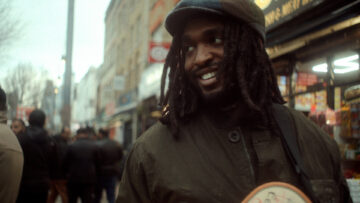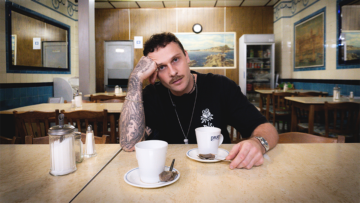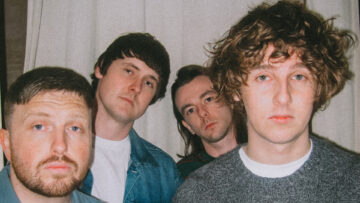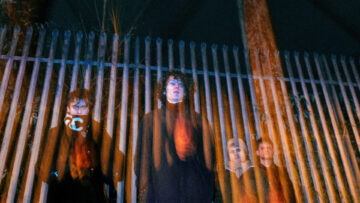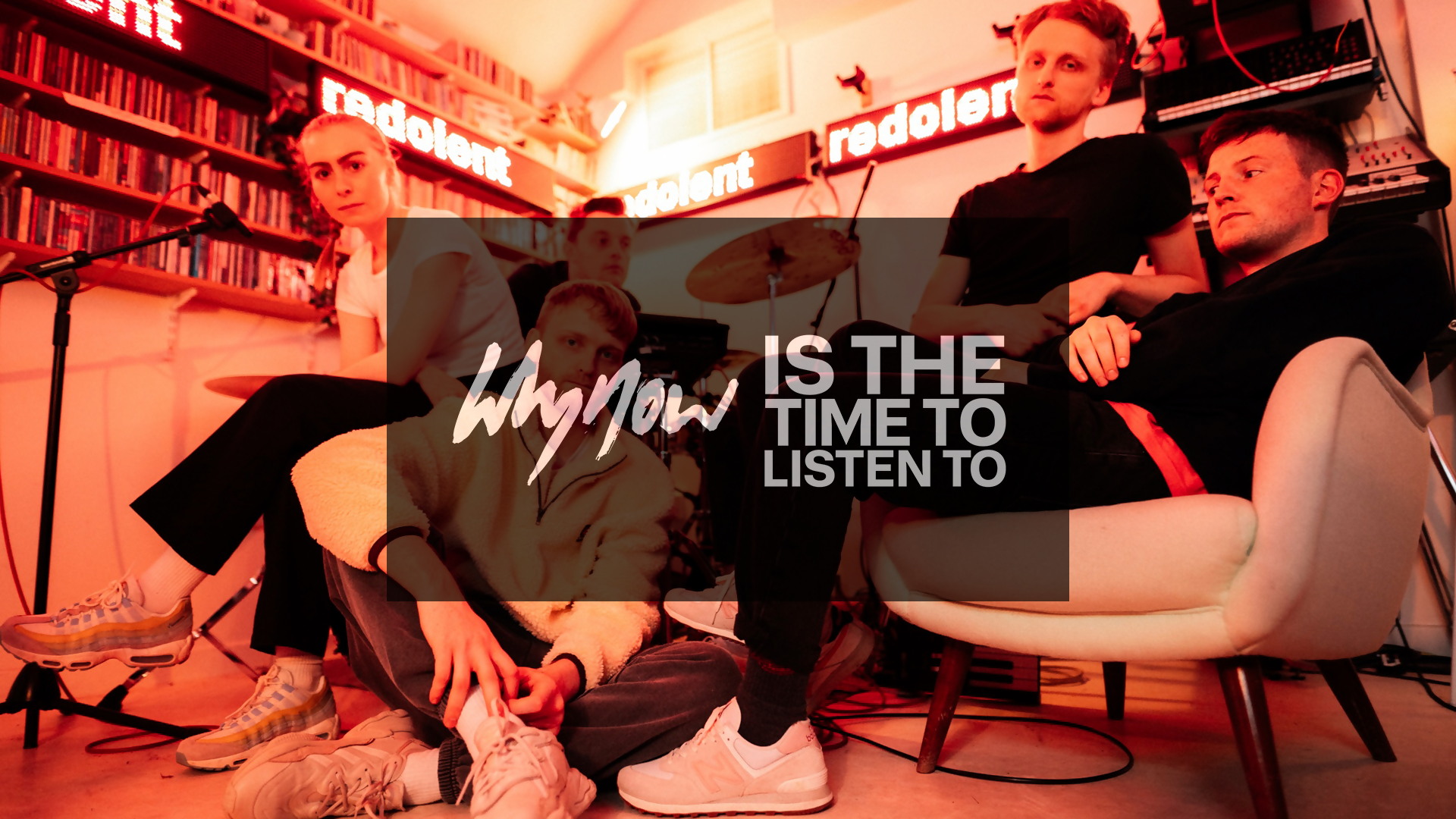
It’s taken a long time for the band to make it to their recent cause for celebration. Their signing to Columbia Records last year was propelled by the release of their track ‘make big money fast online now’, which rather ironically deals with the frustrations of trying to make your way in the music industry.
And now, ahead of their forthcoming EP on 26 January, we caught up with brothers Robin and Danny as part of our series on emerging artists.
Hi both, first obvious question, how did Redolent form?
Robin: Around ten years ago, I was at college with Robbie [White, bassist]. The hardest thing for me was I’m not the most social person – going out and meeting people, I kind of struggled to do that… I always wanted to do the band thing, but I found it almost impossible to get that together in any way. Our lecturer introduced me to Andy [Turnbull, drummers]; he brought him in and said, ‘This guy drums in a way that I think might suit you’. That brought us together and I was just flying, thinking this is the fucking best thing ever.
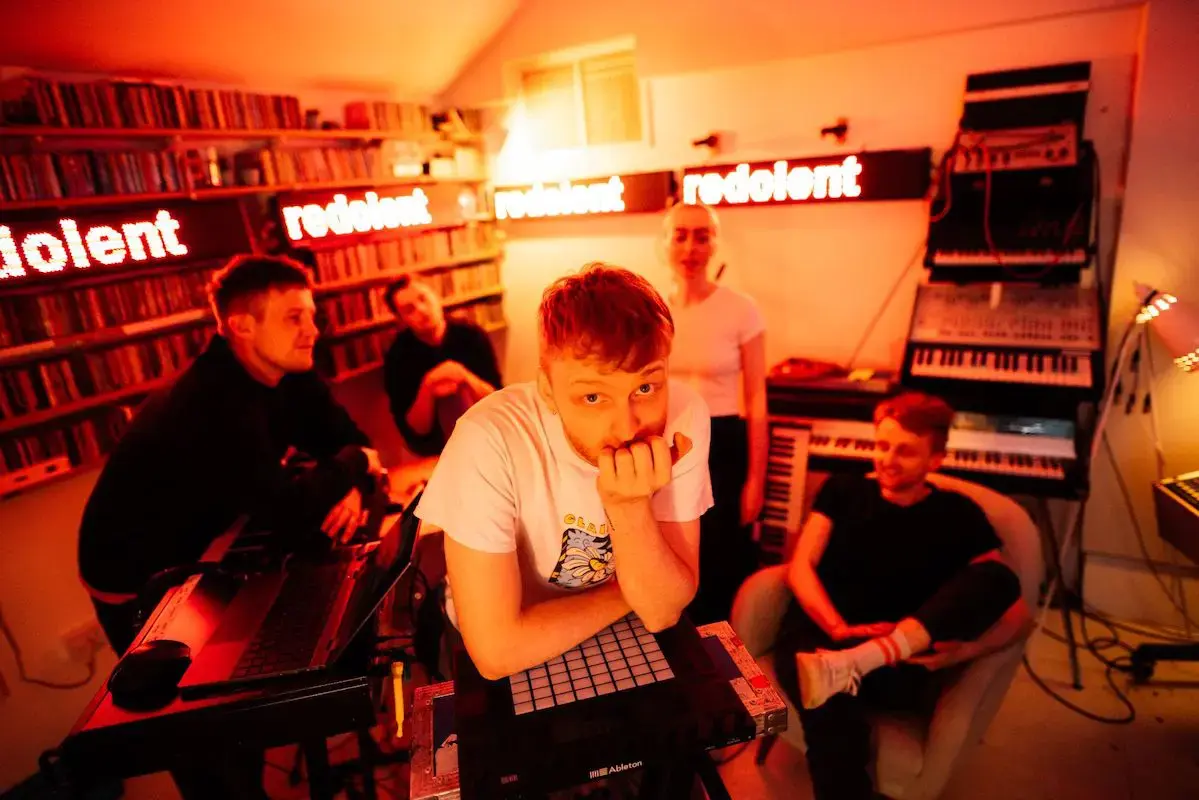
As I got older, I was thinking about what I actually wanted to do with my life, and thought, ‘let’s have one more big go at this, I’ll quit my job and fucking go for it’. So I thought we should simplify the tunes; they were a bit overly complex, so I thought we should simplify them so that they can connect with people a bit more.
Danny: It’s like we just boiled it down to the best bits.
That’s interesting that you’d been going for a decade or so. Along that road did you ever think of packing it in at all?
R: I fixate on things, and this has been the ultimate fixation from age 11. I don’t think I could stop doing it. But I was having to think, ‘Do I stop doing this with a view of getting something out of it? Does anyone want to hear this?’. And then I was worrying how I keep everyone together because obviously we were all doing it but when there’s no immediate benefit, you get frustrated. So through the ten years, I’ve been trying to plan how to keep everyone together and getting whatever each person wants out of it.
Danny: I think what got us through was obsessions, because I’m obsessed with the production and audio side of it; Robin’s obsessed with the writing side of it. So even if there was no one listening, no one paying attention, we’d still do it. And we have the proof of that – from ten years of doing it.
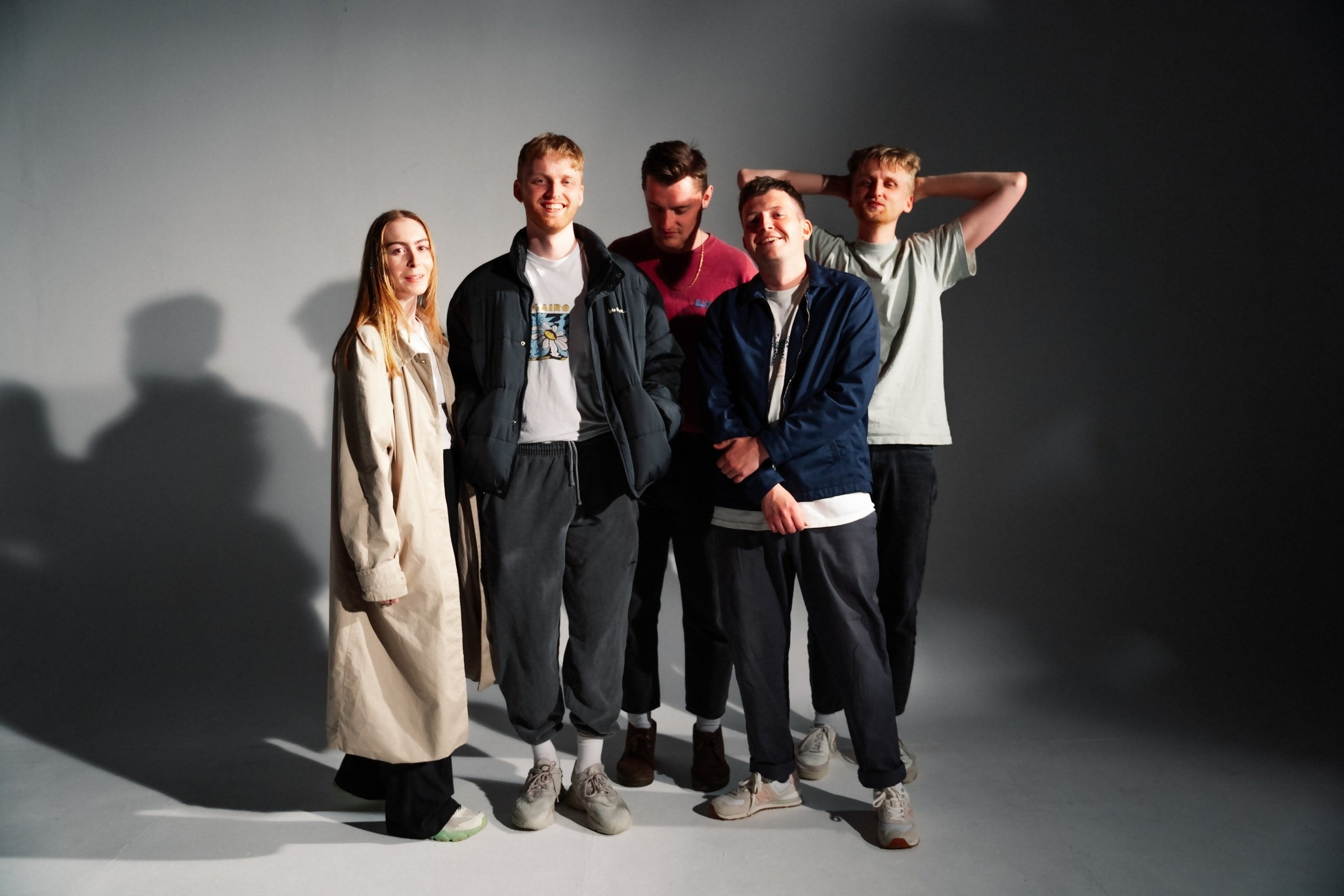
You mentioned being experimental whilst also making music that’s perhaps a little more palatable to wider audiences. How do you strike that balance between something that’s experimental and a bit more mass appealing?
R: I think it’s about keeping it interesting for me. And trying to be relatable, but in a way that I don’t think clichéd. Take the “scrambled egg” line [in the track ‘Space Cadet’]; writing something like that I think clicks with me, and I’m sure there’s other people it will click with. Then the thing we tend to do is write a dead pop tune sometimes, get it 80% down, and then try and bring it back. Just de-cheese-ifying it a bit.
“De-cheese-ifying”, great word.
D: It’s about avoiding whether we’ve heard it before. I’ve worked as a sound engineer with other bands, it happens a lot where they’ll say, ‘That sounds really like X, Y, Z’. That can be a good thing, but with us I’ve noticed it’s more, ‘Ah, fuck, we sound like them’.
R: Fair enough if you want to do that, if you want to emulate someone, but we just find it more interesting to [write something original]. There’s nothing we’re doing that’s totally fucking mental, it’s obviously always going to sound a bit like something, but it’s nice to catch yourself and pull yourself back from sounding too much like whatever it’s influenced by. It’s fucking hard, but to try and do that is really important.
What’s ‘extreme mood swings’ about?
R: That was written quite quickly. It’s almost a collage of soundbites I’ve heard over the years or found interesting. It’s about being really up and down as a person – either me being so, or seeing other people like that and relating to them. We’re making fun of, but we’re making light of, when you’re feeling low and someone’s trying to help you and you’re being a bit of a brat. I find that darkly funny, so I was writing stuff like that, but there’s also serious shit in there as well.
Speaking of releases, you signed to Columbia Records last year. What was that moment like and how much of a confidence boost was it for you?
R: It was really weird for us. We’d been putting stuff out and not getting anything, and no one really paying attention other than A&R people.
D: It was mental. We went from really zero interest to one of the biggest record labels.
R: It was a nice affirmation because [the label] were saying to me a lot of the things I thought were good about what we were doing, but that we’d never had from the outside world. It made me feel validated, which I think we needed at that point.
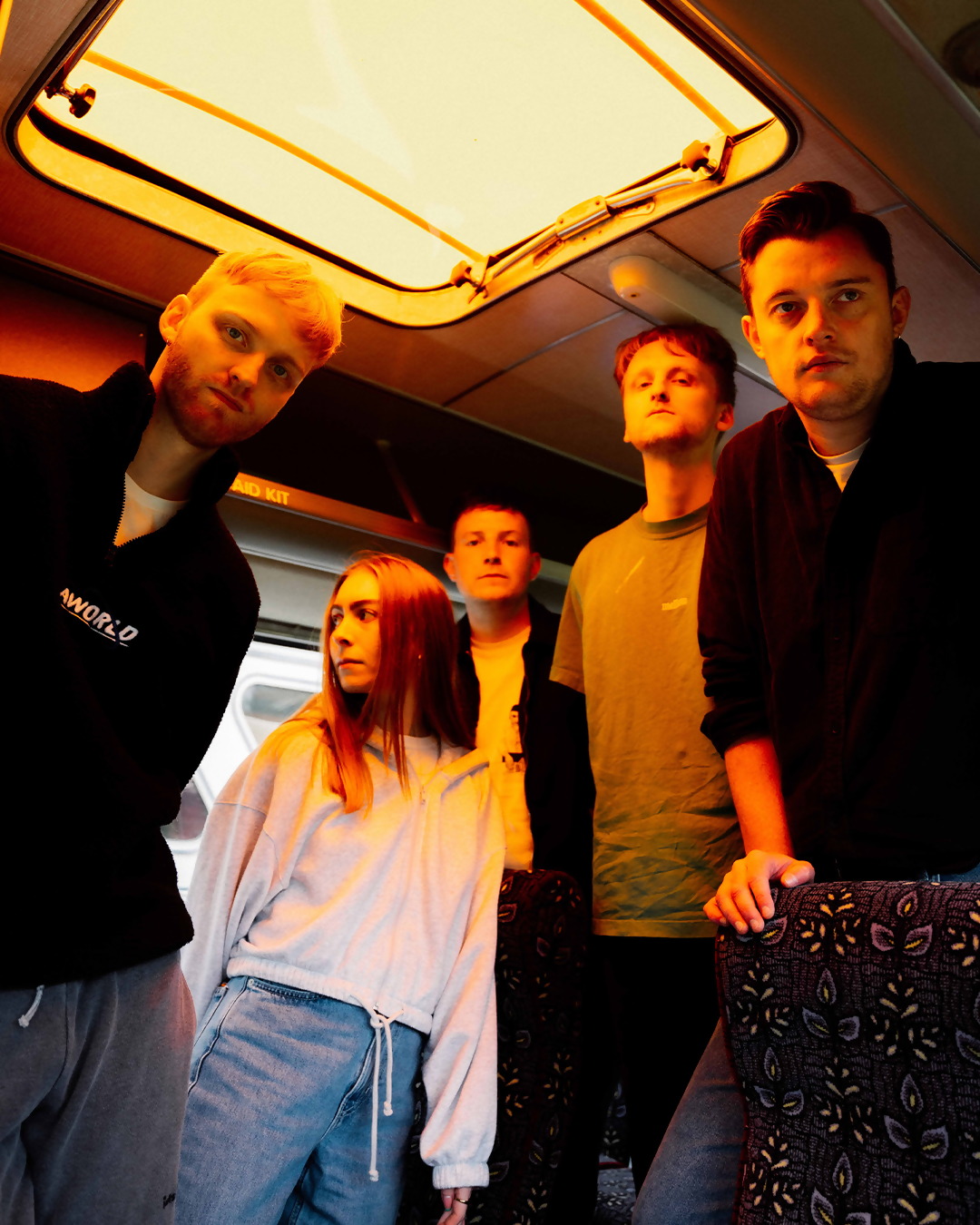
D: I remember sitting there, thinking, ‘Okay, so maybe we’re not shit, this is good’.
R: Because we’d never had that. We’re obviously trying to keep our feet on the ground, but to actually appreciate that and think we’ve got something we can go on with was nice. It was also a bit stressful because you’re wondering if it’s a mad dream.
The thing is it was never really the goal. I’ve met musicians who strive to get signed or get money. Our goal was to connect with people and do stuff and have fun, have a few holidays, and produce something we’re proud of and that I think is good… It’s changed everything for the better.
D: We all got to quit our jobs. That’s the biggest thing: just doing this all day, every day.
And you have your debut EP coming soon. It’s called ‘make big money fast online now’. What’s the track of that name and that title about?
R: That’s the most fucking ironic thing because we wrote that before all the labels got involved and it was about struggling to be a creative person and getting frustrated, but understanding it as well; I’m not sitting there throwing the toys out. It’s just, after ten years of trying to fit it in… like I was working factories, on assembly lines, and coming home and doing the band stuff because I couldn’t commit to a proper career, because all I cared about is music. So I was just venting that. It’s not really about coveting money, but it’s kind of a joke and a release of frustration. Then we released that and two months later, all the money-in-London-people were coming up.
D: We were all pissing ourselves by the fact we made this one song called ‘make big fast money online’ and we got that. When we were talking to them, I was like, ‘Are you getting this [joke]?’
I get the irony of money and labels having released a song like that, but how ambitious are you as a band?
R: In terms of connecting with people, we’re just about as ambitious as you can get. I remember being a teenager when you feel the tunes lot more; I want to do that for as many people as possible in a positive way. I think that’s the main goal for me because that really changed my life; whatever I would be struggling with or enjoying, it would always make the things I was enjoying better, and it would help if I was struggling.
Music’s just the best fucking thing and I want to contribute to that in some sort of way. When it comes right down to it, that’s the main thing for me. Obviously I don’t want to have to go back to the factories either.
And when it comes to live shows, how are you finding live performing so far?
R: It’s something I’ve always wanted to do, but we’ve just not been able to much. It’s been a nice challenge to play more often and see what that does to the tunes and then think about the visuals… I’m hoping to develop it even more, for bigger stages with a lot more visuals, and a lot more interaction with the signs. It’s exciting that it’s the next challenge, something we never thought of.
D: It’s a fun new problem to try and solve.
Redolent’s forthcoming EP, ‘make big money fast online now’, is out on 26 January via Columbia Records.

